Scholz visit caps off German agreements
“German companies are encouraged to implement new projects, and investment expansions in Vietnam such as digital transformation, infrastructure, manufacturing, green development, and renewable energy,” Prime Minister Pham Minh Chinh told German Chancellor Olaf Scholz at their bilateral talks during the latter’s official visit to Vietnam.
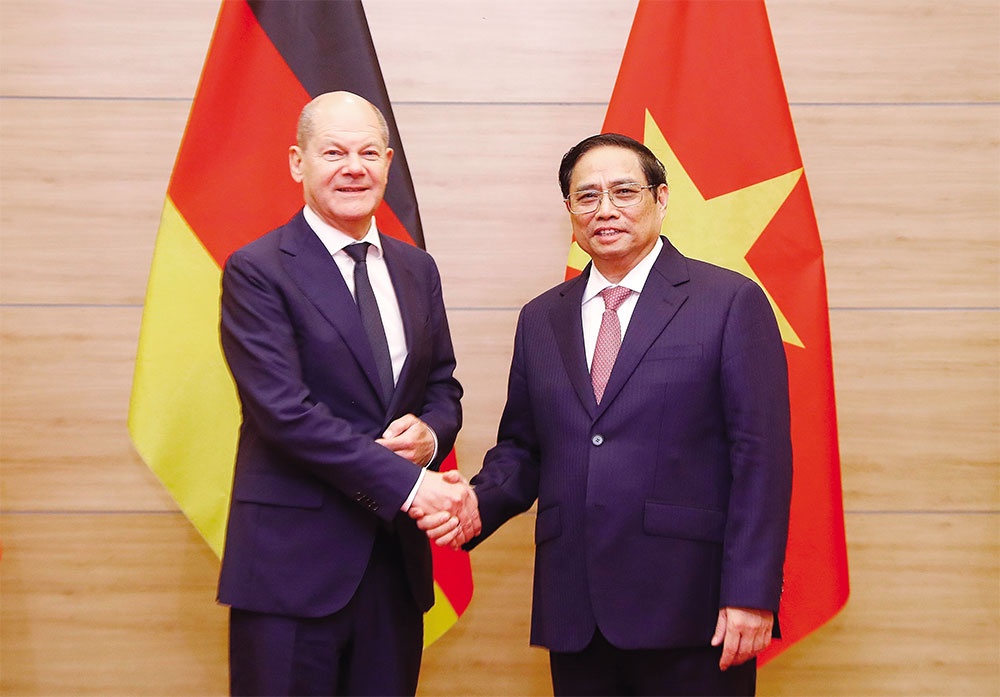 |
| German Chancellor Olaf Scholz met PM Pham Minh Chinh during bilateral talks in Vietnam, photo VNA |
“Vietnam wishes to enjoy German support in institutional and policy improvement to access and mobilise green financial sources, develop a green economy, and boost sustainable development.”
Germany, the world’s fourth-largest industrial economy, has had a successful energy transition towards a green living model. The country has a 100 per cent energy consumption target from renewable sources by 2035. Their achievements are also deemed as valuable experiences for developing countries like Vietnam to commit to environmental protection and sustainable development.
Both leaders agreed that the EU-Vietnam Free Trade Agreement has been and will continue to be a crucial driver of the two nations’ economic, trade, and investment ties.
“German groups and companies are paying bigger attention to the Vietnamese market where they find a stable political situation, a strong economic recovery, and a favourable business and investment climate, especially in the industries of renewable energy, manufacturing, and infrastructure,” Chancellor Scholz noted.
PM Chinh stressed, “The Vietnamese government pledges to create the best conditions for German enterprises to fruitfully do business and investment in Vietnam based on harmonised benefits, and sharing of difficulties and risks. Your success is also our success.”
The first German investments flowed into Vietnam shortly after the country opened its doors to foreigners. In 1992, Bültel produced fashion for brands such as Camel Active in the southern province of Binh Duong. In the same year, Tatonka, an outdoor brand, opened a backpack production line in Ho Chi Minh City.
German investments began gaining steam when Vietnam ascended to the World Trade Organization in 2007 and received further impetus with the 2015 amendments to the laws on enterprises and investment.
According to Vietnam’s Ministry of Planning and Investment, about 500 German companies are currently operating in Vietnam, of which around 80 have manufacturing plants in the country, creating around 47,000 jobs. As of October 20, Germany had 437 valid investment projects in Vietnam, registered at $2.33 billion.
In the January-October 20 period, newly registered capital, stake acquisition, and capital contributions were worth $80 million, with 27 newly licensed projects.
Magnetec, a German producer of electronic spare parts, in July completed procedures on investment registration at Nam Dinh Vu Industrial Park in the northern city of Haiphong. Also, family-owned cleaning technology company Kärcher has decided to select Vietnam as its new overseas production base.
According to the Delegation of German Industry and Commerce in Vietnam (AHK Vietnam), many other German investors are exploring investment opportunities in Vietnam.
AHK Vietnam has worked with authorities of Binh Dinh province to organise a conference on German investment into the south-central locality on November 20-21. The event was scheuled to be attended by 100 German companies.
“Germany is the leading nation in Europe in industrial development. Its goods and products are in high demand in Vietnam,” said Nguyen Thai Binh, director of Binh Dinh’s Department of Foreign Affairs. “German companies produce high-quality environmental-friendly products with clean energy and always pursue sustainable development. Binh Dinh welcomes all of them.”
German thin film tech company Leonhard Kurz has been working with Binh Dinh authorities, committing to invest around $30-40 million in the first stage, producing high-tech thin film products in the province, and total capital will be raised to $100 million for the second stage of the project.
Elsewhere, onshore and offshore wind giant PNE AG operates in 13 countries across four continents. With an upcoming investment of up to $4.8 billion, PNE is building a mega offshore wind power project in Binh Dinh, turning Vietnam into a competitive wind power supplier in the south-eastern region and worldwide. PNE’s plan is to build between 55-165 wind turbines in the country, with a total capacity of up to 2,000MW.
“This project is highly feasible, providing a considerable amount of electricity to Binh Dinh province and the national power system from 6.6-7 billion kWh a year,” said AHK Vietnam.
The largest German investments have been implemented by Bosch, Stada-Pymepharco, and Messer Gases. Bosch is employing a major manufacturing complex for push belts in the southern province of Dong Nai while also operating a research and development centre in Ho Chi Minh City.
Stada-Pymepharco manufactures pharmaceuticals in its factory in the south-central province of Phu Yen. Meanwhile, Messer supplies gases to local customers such as Hoa Phat from its main production hubs in the northern province of Hai Duong and the south-central province of Quang Ngai.
Currently, Vietnam is the largest trade partner of Germany in Southeast Asia. According to the General Department of Vietnam Customs, during 2010-2020, two-way trade turnover increased from $4.11 billion to $9.98 billion, which rose to $11.13 billion last year, with Vietnam’s export turnover from Germany reaching $7.28 billion.
In the first 10 months of 2022, the 2-way trade hit over $10 billion, with Vietnam earning $7.61 billion from exports to Germany, up 30.53 per cent on-year, and Vietnam spending $2.97 billion on imports from Germany, down nearly 6 per cent on-year.
| Marko Walde - Chief representative AHK Vietnam
Vietnam is expected to be an ideal investment hub for German businesses since the country holds many advantages and development potential. Due to its proximity to China and low export tariffs implemented by the EU-Vietnam Free Trade Agreement (EVFTA), Vietnam has become a promising destination outside China but still within Asia. Additionally, supply chain diversification is a crucial element. German investors can reduce manufacturing costs while minimising disruption or delays to current supply chains and managing risks by localising production close to traditional hubs in China. The EVFTA officially took effect in August 2020, opening great opportunities and prospects for cooperation between the two countries in the context of bilateral relations between Vietnam and the EU. Trading between the two parties has witnessed steady growth and is expected to continue, which will be advantageous for German and Vietnamese exporters in various industries. Traditional commodities like machinery and measuring equipment will likely benefit German exporters the most. Due to the Generalised System of Preferences, many positions on the Vietnamese side already had low tariff rates. However, more reductions will take effect, further opening chapters for processed foods, footwear, and agricultural products. Vietnam’s export products considered to have great opportunities from the EVFTA include footwear, clothing, seafood, plastic products, fruits and nuts, and other agricultural products such as rice, sweet corn, garlic, and mushrooms. In the opposite direction, enterprises are also considered to have advantages importing German products thanks to the EVFTA, especially vehicles, electrical machinery and equipment, pharmaceuticals, plastic products, iron and steel, mineral oil fuels, meat, poultry, milk and dairy products, and beverages. |
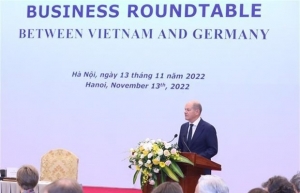 | Vietnamese, German leaders hope for stronger economic ties A business roundtable between Vietnam and Germany was held in Hanoi on November 13 under the co-chair of Prime Minister Pham Minh Chinh and German Chancellor Olaf Scholz. |
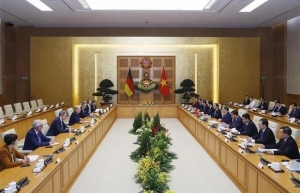 | Vietnamese PM holds talks with German Chancellor Prime Minister Pham Minh Chinh and German Chancellor Olaf Scholz defined major directions and measures to comprehensively advance the bilateral cooperation during their talks in Hanoi on November 13. |
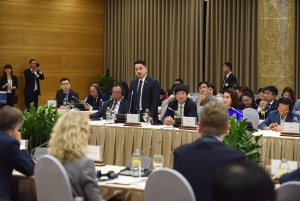 | Masan Group seeks German support on its renewable technology plan Masan Group has made proposals to the German government to facilitate its investment in renewable technology in Germany. |
What the stars mean:
★ Poor ★ ★ Promising ★★★ Good ★★★★ Very good ★★★★★ Exceptional
Related Contents
Latest News
More News
- France supports Vietnam’s growing role in international arena: French Ambassador (January 25, 2026 | 10:11)
- Foreign leaders extend congratulations to Party General Secretary To Lam (January 25, 2026 | 10:01)
- Russian President congratulates Vietnamese Party leader during phone talks (January 25, 2026 | 09:58)
- Worldwide congratulations underscore confidence in Vietnam’s 14th Party Congress (January 23, 2026 | 09:02)
- Political parties, organisations, int’l friends send congratulations to 14th National Party Congress (January 22, 2026 | 09:33)
- 14th National Party Congress: Japanese media highlight Vietnam’s growth targets (January 21, 2026 | 09:46)
- 14th National Party Congress: Driving force for Vietnam to continue renewal, innovation, breakthroughs (January 21, 2026 | 09:42)
- Vietnam remains spiritual support for progressive forces: Colombian party leader (January 21, 2026 | 08:00)
- Int'l media provides large coverage of 14th National Party Congress's first working day (January 20, 2026 | 09:09)
- Vietnamese firms win top honours at ASEAN Digital Awards (January 16, 2026 | 16:45)

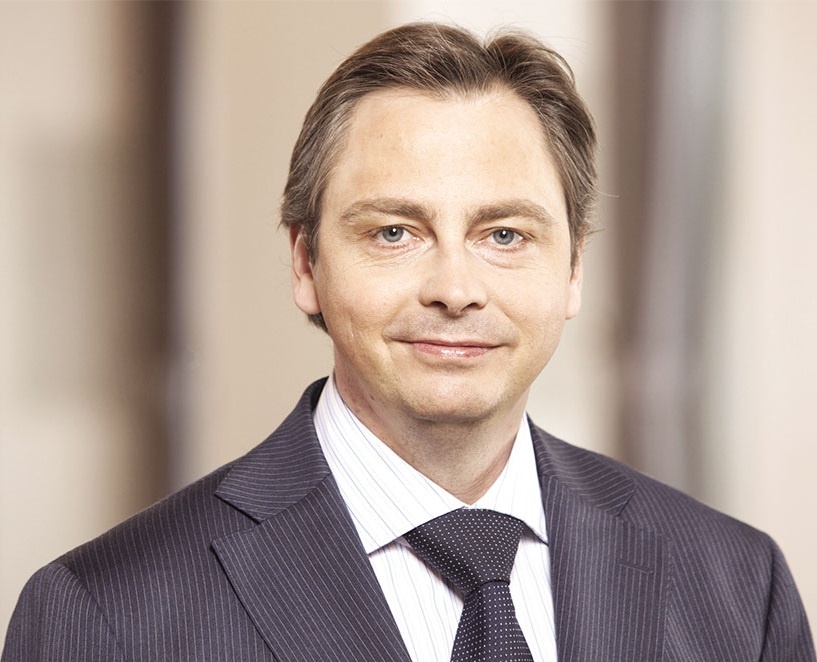
 Tag:
Tag:




















 Mobile Version
Mobile Version